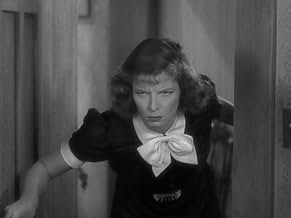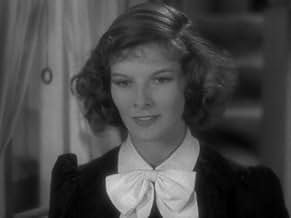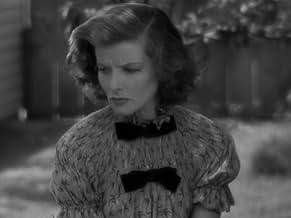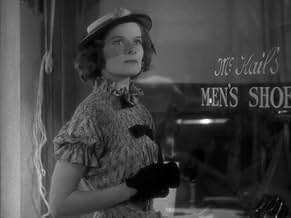IMDb-BEWERTUNG
6,8/10
4775
IHRE BEWERTUNG
Füge eine Handlung in deiner Sprache hinzuA working-class girl is thwarted and embarrassed in her attempts to move up socially by her gauche family and unstable father.A working-class girl is thwarted and embarrassed in her attempts to move up socially by her gauche family and unstable father.A working-class girl is thwarted and embarrassed in her attempts to move up socially by her gauche family and unstable father.
- Für 2 Oscars nominiert
- 4 Gewinne & 3 Nominierungen insgesamt
Hattie McDaniel
- Malena
- (as Hattie McDaniels)
Brooks Benedict
- Henrietta's Dance Partner
- (Nicht genannt)
Harry Bowen
- Laborer Putting Up Sign
- (Nicht genannt)
Steve Carruthers
- Party Guest
- (Nicht genannt)
Monte Carter
- Waiter at Restaurant
- (Nicht genannt)
George Ford
- Party Guest
- (Nicht genannt)
Joe Gilbert
- Party Guest
- (Nicht genannt)
Empfohlene Bewertungen
This is an often under-rated film, and nowadays would certainly have been completely forgotten but for Katharine Hepburn's presence. As a satirical view of the 1920s filmed in the mid 1930s it feels somewhat dated. But not Hepburn's performance. This is is among the best of her RKO contract movies. Her innocence, her (modest) social pretension, her search for love, they all ring verosimilar - if not entirely true to life. And the celebrated window scene with tears and rain and sobs being one with Alice's feelings is far more than just 'clever'. Hepburn fans will like it. Others might very well follow along.
ALICE ADAMS, played by the late, great Katharine Hepburn, is quintessentially the beautiful, ambitious small-town girl put upon by circumstance. She wants desperately to be accepted, to be something other than just a poor "nobody"... to hide the fact that she doesn't come from 'money' and 'background'. This is painfully obvious in the first few scenes, when Alice steals out of the nickel-and-dime store but pauses meaningfully before the classy Vogue shopfront: trying to fool the world and possibly herself into thinking that that was where she was shopping all afternoon. She plans and preens for the high-society Palmer party, even though she has to wear her two-year-old dress, pick flowers for her own corsage, and go with her brother Walter (Frank Albertson) as her date. As everyone at the party ignores Alice, save another social reject Frank Dowling (bit-player Grady Sutton), she spots and is attracted to the rich, handsome Arthur Russell (Fred MacMurray, in a woefully underwritten role). Of course, Mr. Russell is meant to marry party hostess Mildred Palmer. This doesn't last long though--he quickly makes clear his attraction to the magnetic, gracefully awkward Alice, and begins to court her with serious intent. But Alice, in her eagerness to hide her social status, papers over their growing love with lies, which leads to a disastrous dinner party at the Adams abode... even as her family slowly disintegrates around them, partly due to Alice's father Virgil (Fred Stone) wanting to earn more money for his daughter.
The film is generally okay--that's the best word for it. Not great, not even really *good*, but just... okay. It's interesting, and hints at something better than it is. But ultimately, it's a social drama that comes off a bit stilted, with very few fully-fledged characters. The key role of Arthur Russell is remarkably free of a personality, and it's even hard to really put a finger on what Arthur finds so enchanting about Alice... aside from her being fortuitously Katharine Hepburn's identical twin. Oh, Alice is an interesting character, certainly. But so much of her being is concentrated on her social ambitions that it leaves you wondering what Arthur sees in her since these are the very things she hides from him when they are together. Alice's brother and father fare better, but even towards the end, Walter becomes little more than a plot device in an ending that appears to want to serve as a muddled sort of come-uppance for Alice. Sutton as bumbling gentleman and his sister's dance partner is actually a stand-out in his... what? Five minutes of screen time? Intriguing though the message of the film may be (social class does not matter and attempts to rise above it will only keep you from your true self and happiness), the blandness of the characters keeps one from really developing sympathy for the characters.
As for Alice, the film almost seems designed to have the audience keep her at arm's length. When she recognises that she is the one who will drive Arthur away, not because of what he has heard about her but because she cannot bear to confront her own reality head on, she keeps pressing on. The one truly brilliant scene in the film is that of the disastrous dinner party--this is possibly the first film I've seen where the atmosphere is one of muffled horror, both on the part of the participants as well as the audience. As Alice flounders through the dinner, chatting constantly, gaily, desperately, I found myself just wanting her to please, please keep quiet. To stop making things worse. It was very effectively staged, and a wry, clever commentary on Alice's inability to just relax and be herself. But by the end of the film, when Alice realises her foolishness and finally lets her guard down, there just isn't time to muster much sympathy for her character. It doesn't help that her suitor is so terminally boring that the love story is charming at best, but certainly does not come anywhere near to the unadulterated magic of the best classic film couples.
However--and this is a pretty darn big however--although this is probably not one of Hepburn's better 1930s films (she starred in a whole run of those, including LITTLE WOMEN, STAGE DOOR, HOLIDAY and BRINGING UP BABY), this is without a doubt one of the best of her 1930s performances. Never was there a lovelier, more quietly desperate wallflower than Hepburn's Alice. Hepburn is not squarely in her prime here--not yet. For that, I point you to her unparalleled, radiant turn in THE PHILADELPHIA STORY. But in ALICE ADAMS, she is all fresh, awkward beauty. Her performance gives a strong hint of what she will be well capable of in the future--an almost intuitive ability to harness those 'mannerisms' of hers, as her critics call them, to serve the performance and flesh out her character... but also to shed them in an instant and truly, genuinely surprise her audience with beautiful understatement and a remarkable lack of histrionics in her performance. (This would only be refined in her future roles with Spencer Tracy.) As Alice floats through the Palmer party, pretending she is in demand and only waiting for her date, or as she chats with a desperate light in her eyes to Arthur at the Adams' dinner party, Hepburn suffuses the role with the kind of quiet, frantic desire which is simply perfect for her character. It is Hepburn that gives ALICE ADAMS the spark of life it needs to keep from being a mediocre, even bad, film. Her performance is the cornerstone and, quite frankly, the most interesting part of the film.
7.5, largely on the basis of Hepburn's performance which gives this film the extra edge it needs.
The film is generally okay--that's the best word for it. Not great, not even really *good*, but just... okay. It's interesting, and hints at something better than it is. But ultimately, it's a social drama that comes off a bit stilted, with very few fully-fledged characters. The key role of Arthur Russell is remarkably free of a personality, and it's even hard to really put a finger on what Arthur finds so enchanting about Alice... aside from her being fortuitously Katharine Hepburn's identical twin. Oh, Alice is an interesting character, certainly. But so much of her being is concentrated on her social ambitions that it leaves you wondering what Arthur sees in her since these are the very things she hides from him when they are together. Alice's brother and father fare better, but even towards the end, Walter becomes little more than a plot device in an ending that appears to want to serve as a muddled sort of come-uppance for Alice. Sutton as bumbling gentleman and his sister's dance partner is actually a stand-out in his... what? Five minutes of screen time? Intriguing though the message of the film may be (social class does not matter and attempts to rise above it will only keep you from your true self and happiness), the blandness of the characters keeps one from really developing sympathy for the characters.
As for Alice, the film almost seems designed to have the audience keep her at arm's length. When she recognises that she is the one who will drive Arthur away, not because of what he has heard about her but because she cannot bear to confront her own reality head on, she keeps pressing on. The one truly brilliant scene in the film is that of the disastrous dinner party--this is possibly the first film I've seen where the atmosphere is one of muffled horror, both on the part of the participants as well as the audience. As Alice flounders through the dinner, chatting constantly, gaily, desperately, I found myself just wanting her to please, please keep quiet. To stop making things worse. It was very effectively staged, and a wry, clever commentary on Alice's inability to just relax and be herself. But by the end of the film, when Alice realises her foolishness and finally lets her guard down, there just isn't time to muster much sympathy for her character. It doesn't help that her suitor is so terminally boring that the love story is charming at best, but certainly does not come anywhere near to the unadulterated magic of the best classic film couples.
However--and this is a pretty darn big however--although this is probably not one of Hepburn's better 1930s films (she starred in a whole run of those, including LITTLE WOMEN, STAGE DOOR, HOLIDAY and BRINGING UP BABY), this is without a doubt one of the best of her 1930s performances. Never was there a lovelier, more quietly desperate wallflower than Hepburn's Alice. Hepburn is not squarely in her prime here--not yet. For that, I point you to her unparalleled, radiant turn in THE PHILADELPHIA STORY. But in ALICE ADAMS, she is all fresh, awkward beauty. Her performance gives a strong hint of what she will be well capable of in the future--an almost intuitive ability to harness those 'mannerisms' of hers, as her critics call them, to serve the performance and flesh out her character... but also to shed them in an instant and truly, genuinely surprise her audience with beautiful understatement and a remarkable lack of histrionics in her performance. (This would only be refined in her future roles with Spencer Tracy.) As Alice floats through the Palmer party, pretending she is in demand and only waiting for her date, or as she chats with a desperate light in her eyes to Arthur at the Adams' dinner party, Hepburn suffuses the role with the kind of quiet, frantic desire which is simply perfect for her character. It is Hepburn that gives ALICE ADAMS the spark of life it needs to keep from being a mediocre, even bad, film. Her performance is the cornerstone and, quite frankly, the most interesting part of the film.
7.5, largely on the basis of Hepburn's performance which gives this film the extra edge it needs.
Showing her versatility Katharine Hepburn gets her best part since her Oscar winning Morning Glory in the title role of Alice Adams. Alice and Eva Lovelace are worlds apart. Eva leaves her small town in search of fame and fortune in the theater. But poor Alice just wants to compete with the rest of the girls in her midwest Indiana small town that Booth Tarkington wrote about and land a real Prince Charming of a fellow.
The Prince shows up at a dance she goes to in the person of Fred MacMurray. She's taken with him, but she's ashamed of her family's rather humble living condition. When MacMurray does come calling they have a family dinner that turns into a real disaster.
Kate got one of her Oscar nominations for her role and MacMurray also gets one of his best early film parts as well. Kate's family is also nicely cast with Ann Shoemaker, Frank Albertson, and especially Fred Stone filling out the roles of mother, brother, and father. I do kind of feel sorry for Stone, he's really put upon by his family. In today's world Ann Shoemaker would have gone out and gotten a second job for another income, back then that would have been unthinkable.
Alice Adams is a nice nostalgic trip by Booth Tarkington into the lives and mores of small town Indiana. This film was also George Stevens's first major film and he'd work with Kate again in Woman of the Year.
The Prince shows up at a dance she goes to in the person of Fred MacMurray. She's taken with him, but she's ashamed of her family's rather humble living condition. When MacMurray does come calling they have a family dinner that turns into a real disaster.
Kate got one of her Oscar nominations for her role and MacMurray also gets one of his best early film parts as well. Kate's family is also nicely cast with Ann Shoemaker, Frank Albertson, and especially Fred Stone filling out the roles of mother, brother, and father. I do kind of feel sorry for Stone, he's really put upon by his family. In today's world Ann Shoemaker would have gone out and gotten a second job for another income, back then that would have been unthinkable.
Alice Adams is a nice nostalgic trip by Booth Tarkington into the lives and mores of small town Indiana. This film was also George Stevens's first major film and he'd work with Kate again in Woman of the Year.
I suppose that no one ever gave Alice Adams the sage advice that when one goes on a date with somebody, you should just "be yourself." But in the 1935 film "Alice Adams," Katharine Hepburn's title character is too busy trying to hide her humble background and put on hoity-toity airs, whenever she goes out shopping, to a party and especially when being courted, to EVER really be herself, and this desire to climb that social ladder only leads to embarrassing predicaments. This is actually a very charming film, and Hepburn, 28 here, looks extremely pretty, especially when given any number of beautiful close-ups by director George Stevens. The film boasts two wonderful and heartbreaking scenes: an early sequence at a ritzy dance, where wallflower Alice hugs the sidelines while pretending to no one in particular that everything is fine, and a late scene, in which the well-to-do young courter who has taken a fancy to her (nicely played by Fred MacMurray) suffers through a formal dinner with Alice's family in the middle of a heat wave. Hattie McDaniel (listed here as "McDaniels") almost steals this dinner scene as a slovenly, gum-chewing maid. Alice, despite her tendency to put on airs, is at heart a sweet girl (we see that in her relationships with her parents and brother), and the viewer is grateful that a young man is able to see beyond her B.S. and discern her finer qualities. But will upper-class Fred accept Alice, once he learns of her background? That, my IMDb'er friend, I urge you to find out for yourself...
ALICE ADAMS is the film I'd heard about for years as one of Hepburn's best early films so when I had the chance to watch it recently on TCM I took advantage of it.
From a novel by Booth Tarkington, it concerns a young woman anxious to connect socially with the right people who manages to attract the attention of a handsome and well-to-do young man (Fred MacMurray) at a party. Hepburn shines in the title role, looking fresh and attractive, struggling to keep him interested in her--but unfortunately, with all of her trademark mannerisms not always held in check.
She does well in the role but, in my opinion, the real magnet of interest is the under-appreciated Fred MacMurray who does a sincere and effortless job as her suitor in a role that could not have been easy to bring off. Both stars are in their physical prime, but MacMurray's naturalness only makes Hepburn look even more mannered than usual. Fortunately, this works because her character is supposed to be putting on airs. But at times, this is overdone.
The awkwardness of the social situations are exploited--and the highpoint has to be the warm dinner served on a hot evening, complete with maid service (by Hattie McDaniel) in one of the movie's most amusing, if uncomfortable, scenes. Here too, MacMurray displays just the right amount of stability against all odds. Fred Stone provides a number of chuckles as Hepburn's so provincial father.
All of the supporting roles are nicely filled, with special praise for Ann Shoemaker as the concerned mother anxious for her daughter to find the right suitor. But it's Hepburn's showcase under George Stevens' sensitive direction and she is convincing despite the overly mannered performance.
Summing up: Although some of the situations seemed a bit forced and not everyone will appreciate the humor at Hattie McDaniel's expense, it's worth watching for Hepburn and MacMurray alone.
From a novel by Booth Tarkington, it concerns a young woman anxious to connect socially with the right people who manages to attract the attention of a handsome and well-to-do young man (Fred MacMurray) at a party. Hepburn shines in the title role, looking fresh and attractive, struggling to keep him interested in her--but unfortunately, with all of her trademark mannerisms not always held in check.
She does well in the role but, in my opinion, the real magnet of interest is the under-appreciated Fred MacMurray who does a sincere and effortless job as her suitor in a role that could not have been easy to bring off. Both stars are in their physical prime, but MacMurray's naturalness only makes Hepburn look even more mannered than usual. Fortunately, this works because her character is supposed to be putting on airs. But at times, this is overdone.
The awkwardness of the social situations are exploited--and the highpoint has to be the warm dinner served on a hot evening, complete with maid service (by Hattie McDaniel) in one of the movie's most amusing, if uncomfortable, scenes. Here too, MacMurray displays just the right amount of stability against all odds. Fred Stone provides a number of chuckles as Hepburn's so provincial father.
All of the supporting roles are nicely filled, with special praise for Ann Shoemaker as the concerned mother anxious for her daughter to find the right suitor. But it's Hepburn's showcase under George Stevens' sensitive direction and she is convincing despite the overly mannered performance.
Summing up: Although some of the situations seemed a bit forced and not everyone will appreciate the humor at Hattie McDaniel's expense, it's worth watching for Hepburn and MacMurray alone.
Wusstest du schon
- WissenswertesThough Bette Davis won the 1935 Academy Award/Oscar for Gefährliche Liebe (1935) beating out Katharine Hepburn in Alice Adams (1935), Davis was noted for saying more than once that she didn't deserve the award that year and that the one who did was Katharine Hepburn.
- PatzerWhen Alice walks with Arthur toward her house for the first time, a woman watering her shrubs can be seen and a letter carrier walks up, then back down her porch steps twice. The background scene repeats itself, letter carrier, woman setting down hose, etc. The letter carrier approaches Alice moments later where she then has to shamefully admit to Arthur that this is, indeed, her house that she is in front of. Likely a rear projection scene that was duplicated.
- Zitate
Mrs. Adams: Malena fell down the cellar stairs!
Virgil Adams: Did she break any of our things?
- VerbindungenFeatured in George Stevens (1984)
Top-Auswahl
Melde dich zum Bewerten an und greife auf die Watchlist für personalisierte Empfehlungen zu.
Details
- Erscheinungsdatum
- Herkunftsland
- Sprache
- Auch bekannt als
- Booth Tarkington's Alice Adams
- Drehorte
- Produktionsfirma
- Weitere beteiligte Unternehmen bei IMDbPro anzeigen
- Laufzeit1 Stunde 39 Minuten
- Farbe
- Seitenverhältnis
- 1.37 : 1
Zu dieser Seite beitragen
Bearbeitung vorschlagen oder fehlenden Inhalt hinzufügen





































